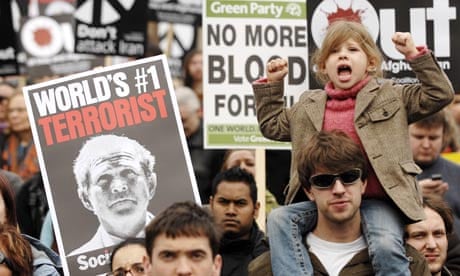Marching in the drizzle against wars in far-off countries, writing letters protesting the government's latest reactionary policy, sitting through interminable meetings that keep sprouting Any Other Business. It may be noble, but political activism is hardly a barrel of laughs. And yet it makes you happier.
So find two university psychologists in new research that looks for the first time at the link between political activity and wellbeing. Malte Klar and Tim Kasser started by interviewing two sets of around 350 college students, both about their degree of political engagement and their levels of happiness and optimism. Both times, they found that those most inclined to go on a demo were also the cheeriest.
So there's a link – but can politics actually make a person happier? In the third study, the academics took a bunch of students and divided them up into groups. The first were encouraged to write to the management of the college cafeteria asking for tastier food. The next lot wrote asking the cafe to source local or Fairtrade products. They were then tested on their wellbeing, and the group who had involved themselves in the political debate were far and away the strongest on the "vitality" scale: they felt more alive and enriched than those who merely complained about the menu.
There are many fascinating aspects to this . First, the activist-students didn't necessarily care about food ethics, but just taking action made them feel better. Second, sending a memo is hardly the most engaging political action – and yet it had a big impact on those taking it. Third, the study flies in the face of the popular wisdom that happiness resides in creature comforts and relative affluence. Perhaps activism gives people a sense of purpose, or of agency or just a chance to hang out with other people. Most likely it does all of the above.
"I will fight for what I believe in until I drop dead," Barbara Castle told this paper in 1998. "And that's what keeps you alive." Maybe the Red Queen was on to something.

Comments (…)
Sign in or create your Guardian account to join the discussion